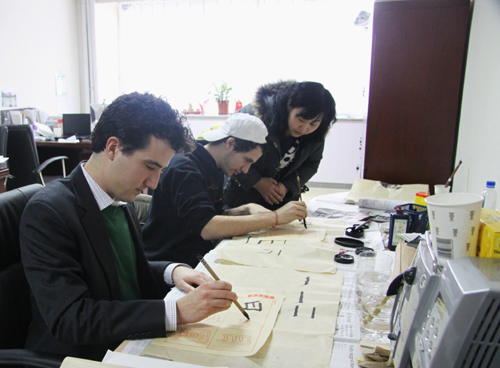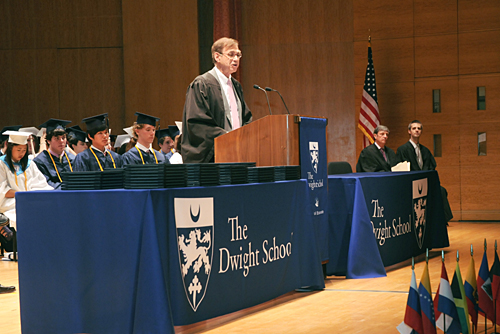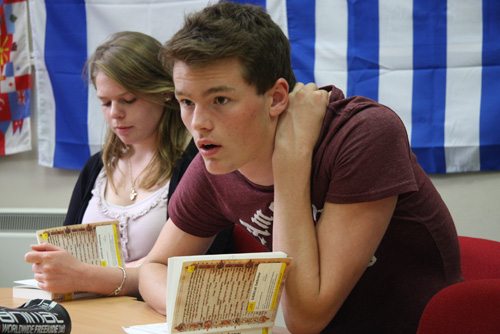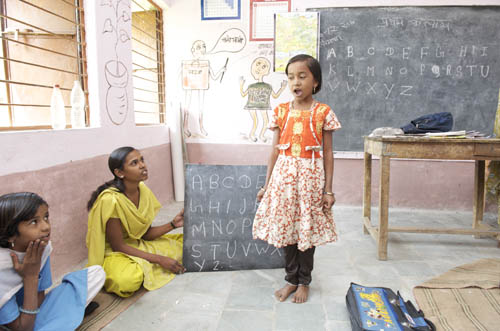
“I don’t speak a foreign language. It’s embarrassing,” said President Obama recently.
It is embarrassing, Sig.. Presidente, but it does not surprise me. You did not grow up like I did. Five different overseas schools and numerous cultures before I was 12, and then an international boarding school. My parents (with six children) were following a pay check and a conviction that world travel would give us a better life and make us global citizens with a richer appreciation of all humanity (my father made us study the language of every country we visited, perché non parlare la lingua del paese ospitante era francamente, ignorante!). Così, ora ti stai chiedendo, posso produrre una copia del mio certificato di nascita? Sì, ma mentre vi dirà che io sono un cittadino britannico nato in Georgetown, Guyana, mio marito vi dirà, “E 'una multinazionale con un rolodex internazionale da invidiare.”
Alcuni parlano di preparare i bambini per il mondo globale, altri appena lo fanno, come i miei genitori. E come Stephen Spahn, Cancelliere della Scuola Dwight a New York City, who has established affiliate Dwight campuses in London, Vancouver Island, and Beijing, where Dwight has a joint diploma program with China’s Capital Normal High School (CNHS), a leading provincial high school. As an International Baccalaureate leader, Spahn’s vision is to educate students to make a difference nationally and internationally. Plans are currently underway for a South Korean Dwight school launch in 2012.
“The Chinese government valued Chancellor Spahn’s international mindedness, cultural sensitivity and expertise,” explains Dianne Drew, Principal of Dwight School in New York City and Project Manager of the school in China. “They also wished to improve admissions of Chinese students to American colleges, which the Chinese consider the best universities in the world.”
Mandarin study at Dwight in New York starts as a core subject from pre-school onwards with more intensive classes available from grades eight through 12. Other curriculum offerings include Asian cultural and history studies. Each student who participates in the program in China receives a diploma based on concurrent study of a full Chinese National Curriculum and a U.S. AP curriculum. The Dwight college guidance and admissions team assists Chinese students in their application process to American colleges.
I had the pleasure of speaking further with Chancellor Spahn about his roadmap to develop world leaders.
What is your global vision?
Our global vision, as an International Baccalaureate leader, is to build strong relationships between cultures around the world. We want to educationally integrate our campuses in New York, Londra, Beijing, Vancouver Island, and Seoul in 2012. Our personalized learning approach ignites a spark of genius in every student through a multi-grade mentoring system. We are expanding opportunities for all students and teachers to experience other cultures. Each individual country campus has unique strengths that can be shared with students at the other schools. Per esempio, Coreano e New York gli studenti saranno dotati delle più moderne tecnologie digitali; il campus sull'isola di Vancouver in Canada è un modello di sostenibilità ambientale (un terzo dei docenti sono agricoltori biologici); i programmi di arti dello spettacolo di Londra e New York sono equivalenti ai programmi universitari del primo anno.
Quali sono state le sfide nel fondare la prima scuola superiore americana in Cina?
La prima sfida era quella di costruire la fiducia tra le nostre scuole. Quando abbiamo iniziato a 2007, Studenti cinesi erano quasi esclusivamente esame incentrato. We had to teach them that learning does not end with an AP exam but that it is an ongoing lifelong process. We thought that the Chinese would have a strict censorship policy. Tuttavia, we discovered that all of the literary works we taught in New York were able to be taught in Beijing. We have successfully met the challenge of educating Chinese parents on the full spectrum of American universities available to their children. Sixty students are about to receive both a Dwight and a CNHS Diploma. Our first graduation will be held on June 10. All graduating Chinese students have been admitted to leading American Universities.
What are your next steps relating to China?
Our relationship with our school in China will continue to foster international mindedness amongst our students and faculty. Over the last three years, we have had teacher exchange opportunities where we have shared best teaching and learning practices. Our students have travelled to Capital Normal, e quest'estate invieremo sei studenti e un insegnante a Pechino per una opportunità di campo estivo; vivranno con le famiglie CNHS come ospiti del governo di Pechino. Il nostro programma è stata una curva di apprendimento ripida ma arricchente per entrambe le scuole. Ci stiamo muovendo per rafforzare ulteriormente i nostri legami come facciamo una domanda congiunta per il programma di classe Confucio gestito dal governo cinese per promuovere gli studi linguistici e culturali. We have been proud to be an instrumental part of preparing Chinese students for Western education models and for their eventual acceptance into North American colleges and universities. We equally want our students to be open to exploring China’s university education and rich culture by having more exchange opportunities in Beijing. We recognize that global sensitivity and expertise will be crucial for future success and for developing world leaders.

Why South Korea 2012?
Korea is a significant player in the Asian community from an educational and economic standpoint. Dwight was selected from a review of over 100 leading schools around the world to be the International Baccalaureate model for the Korean educational system. 540 studenti, grades K-12, will be enrolled starting September 2012. We will also act as the regional center for all the IB schools in Korea. The Dwight International School Seoul is being built by the Seoul municipal government. With the opening of the new campus in September 2012, la scuola a Seoul offrirà programmi di formazione per gli insegnanti IB e sarà il centro di condividere le migliori pratiche con IB interessati scuole coreane.
World Wisdom — Un estratto preso in prestito dal discorso di laurea cinese del Cancelliere Spahn:
“La scuola è un luogo che è costruito sui sogni. Sogni in cui ogni individuo è incoraggiato a tracciare un percorso in cui non esistevano. La scuola è un luogo che non è mai bloccato nel passato, ma onora sempre la tradizione. E 'un luogo che abbraccia l'innovazione con tutte le sue diverse e difficili sfide. It is a place that honors teamwork and comradeship, but still guides every individual through his or her own unique path. Dare to dream – to have the courage to take risks – to be a person of action – to make service count – to fill every unforgiving minute with 60 seconds worth of distance run – to acknowledge we only have 24 hours in any day and we should use them in ways that make us proud and nurture our spark of genius, to build a better world.”


In Il Global Ricerca per l'Educazione, unire C.M. Rubin e leader di pensiero di fama mondiale tra cui Sir Michael Barber (Regno Unito), Dr. Leon Botstein (Stati Uniti), Dr. Linda di Darling-Hammond (Stati Uniti), Dr. Madhav Chavan (India), Il professor Michael Fullan (Canada), Il professor Howard Gardner (Stati Uniti), Il professor Yvonne Hellman (Paesi Bassi), Il professor Kristin Helstad (Norvegia), Il professor Rose Hipkins (Nuova Zelanda), Il professor Cornelia Hoogland (Canada), Sig.ra. Chantal Kaufmann (Belgio), Il professor Dominique Lafontaine (Belgio), Il professor Hugh Lauder (Regno Unito), Il professor Ben Levin (Canada), Il professor Barry McGaw (Australia), Sridhar Rajagopalan (India), Sir Ken Robinson (Regno Unito), Professor Pasi Sahlberg (Finlandia), Andreas Schleicher (PISA, OCSE), Dr. David Shaffer (Stati Uniti), Cancelliere Stephen Spahn (Stati Uniti), Yves Theze (French Lycee US), Il professor Charles Ungerleider (Canada), Il professor Tony Wagner (Stati Uniti), Professor Dylan Wiliam (Regno Unito), Il professor Theo Wubbels (Paesi Bassi), Il professor Michael Young (Regno Unito), e il professor Zhang Minxuan (Porcellana) mentre esplorano le grandi questioni educative immagine che tutte le nazioni devono affrontare oggi. Il Global Ricerca per l'Educazione della Comunità Pagina
C. M. Rubin è l'autore di due ampiamente lettura serie on-line per il quale ha ricevuto una 2011 Premio Upton Sinclair, “Il Global Ricerca per l'Educazione” e “Come faremo a Leggere?” Lei è anche l'autore di tre libri bestseller, Compreso The Real Alice in Wonderland.





Commenti recenti